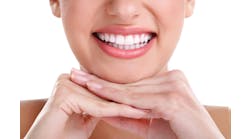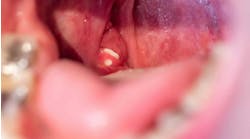by Linda DeVore, RDH, MA
New research supports the benefit of adjunctive therapy with mouthrinses.
Encouraging patients to develop effective oral care routines that will provide long-term benefits is one of our most important roles as oral health care professionals. As clinical practitioners, dental hygienists are faced with a myriad of challenges when it comes to influencing patient behavior.
In clinical practice, dental hygienists focus a great deal of their educational efforts on teaching clients the relationship of bacterial plaque to oral disease and how to mechanically disrupt plaque on a daily basis. Yet, low levels of compliance among clients frustrate many clinicians. Similarly, a lack of measurable improvements to gingival and periodontal health may make patients feel plaque control efforts are useless. There are many possible explanations for ineffective plaque control, including lack of motivation to spend adequate time brushing and flossing, lack of dexterity to perform these procedures, and lack of understanding of the importance of consistent, effective oral hygiene for achieving and maintaining optimal oral health.
Data presented earlier this year at the International Association for Dental Research (IADR) meeting supports the benefit of adding an antiseptic mouthrinse to patients' daily homecare routines, especially for individuals who do not achieve effective plaque control and gingival health with brushing, flossing, and other mechanical means. The research found that rinsing with an essential oil antiseptic mouthrinse is as effective as daily flossing in improving gingival health and reducing plaque, particularly in the hard-to-reach areas of the mouth.
The purpose of this article is to summarize the results of these two studies and suggest the application of these findings to clinical practice.
Brushing and flossing are the most widely accepted procedures - the "gold standard" for controlling bacterial plaque, gingivitis, and periodontal disease. But these mechanical methods have limitations. While most people do brush, very few spend the recommended two minutes using correct brushing technique each time. Based on several studies, it has been estimated that the typical brushing time for adults is 24 to 60 seconds, rather than the recommended two minutes.
Flossing requires an even greater degree of technical efficiency than brushing to achieve good clinical results. Only a fraction of those who use dental floss do so correctly throughout the mouth.
In recent years, advances in toothbrush design and the availability of additional plaque control aids provide options for mechanical plaque control. Clinicians, however, continue to treat many individuals who do not achieve optimal levels of oral hygiene. If our goal is to achieve better overall oral health, then we need to continue seeking additional means to help clients attain the best possible results.
Mouthrinses have long been a favorite of the public because they are easy to use and provide perceived benefits, especially for freshening breath. In the mid-1980s, mouthrinses gained professional acceptance for therapeutic value when researchers demonstrated the efficacy of antimicrobial mouthrinses in preventing and reducing plaque and gingivitis. Based on scientific information derived from clinical trials on an essential oil mouthrinse (Listerine® Antiseptic Mouthrinse) and a chlorhexidine gluconate mouthrinse (Peridex®), the American Dental Association Council on Dental Therapeutics (currently the Council on Scientific Affairs) awarded the ADA Seal to these two products.
The antiseptics in these two mouthrinses are chemical agents that either kill microorganisms or interfere with their reproduction or metabolism. Peridex, a prescription mouthrinse, and Listerine, an over-the-counter mouthrinse, have somewhat different mechanisms of action. But both are effective in inhibiting and reducing plaque as well as improving gingival health. Therefore, based on individual patient needs, clinicians began recommending these mouthrinses as adjuncts to mechanical plaque control to help prevent and reduce plaque and gingivitis.
New clinical trials, such as those presented at the IADR meeting, can guide us in identifying an optimal oral home care routine for our patients. The studies were two six-month clinical trials conducted at separate research centers. The trials compared the efficacy of brushing and antimicrobial mouthrinse (Listerine) therapy to brushing and flossing on the inhibition of plaque and gingivitis. In both studies, Listerine was clinically comparable to flossing in controlling interproximal gingivitis and better for interproximal plaque reduction. All comparisons were versus a negative control.
The two randomized, evaluator-blinded, controlled parallel group studies included more than 600 patients between ages 18 and 63, with mild to moderate levels of gingivitis, but without moderate or advanced periodontitis. Subjects were randomized into three groups: brushing and flossing; brushing and Listerine antiseptic mouthrinse; and negative control: brushing and placebo mouthrinse.
All subjects received a prophylaxis, brush, and fluoride dentifrice. They were instructed to brush twice a day. A dental professional trained the subjects in the flossing group on the correct flossing technique at baseline. The subjects flossed once a day, the frequency generally recommended for flossing. Subjects in the rinsing groups used 20 ml of their assigned rinse (Listerine or placebo) for 30 seconds twice a day, which is the usual antiseptic mouthrinse regimen. All subjects were monitored monthly for compliance with their assigned regimen and re-examined at three and six months after baseline.
Interproximal plaque accumulation was reduced by 37.5 percent and 20 percent (p<0.001) at the two study sites, respectively, in patients who rinsed twice a day with Listerine. In comparison, the patients who flossed daily showed a 2.1 percent (p=0.305) and 3.4 percent (p=0.134) reduction in interproximal plaque accumulation, a reduction that was not significantly different from the control group. In addition to site-specific plaque reduction, patients who rinsed twice a day with Listerine showed a 7.9 percent and 11.1 percent (p<0.001) reduction in interproximal gingivitis vs. an 8.3 percent (p<0.001) and 4.3 percent (p=0.006) reduction in those who flossed daily.
While these studies do not suggest that brushing and rinsing alone should take the place of the long established recommendation of brushing and flossing, these findings help validate the benefit of adding an essential oil mouthrinse as adjunctive therapy to a client's oral hygiene routine.
Clinical trials provide one of the highest levels of evidence that health care professionals can use to make evidence-based decisions for patient care. Such studies provide support for the recommendations we make to our clients on how best to improve and then maintain optimal oral health. With these additional data on the efficacy of essential oil mouthrinse, we increase our confidence in the body of evidence supporting antiseptic mouthrinse use. These clinical findings support the notion that rinsing with antiseptic mouthrinse, such as Listerine, complements mechanical oral-care methods.
As always, dental hygienists need to work with each client to determine what is best for each individual's oral care routine, plan appropriate strategies, teach techniques for implementing the methods and products suggested, and evaluate the results. When clinicians add an antimicrobial mouthrinse to an oral hygiene routine, they should describe and demonstrate correct usage according to the manufacturer's recommendations, which have been derived from clinical trials. We cannot assume that clients will know how to use products correctly to achieve the most therapeutic benefits.
Dental hygienists are well qualified to help individuals make good product choices for their oral health care needs. Creating a specific oral care program tailored to the needs of each client will most likely yield the positive results desired. Clinicians and patients together can choose the best products by assessing oral conditions, physical abilities and limitations, cost, and flavor preferences. With repeated positive reinforcement at continuing care visits, we can work with clients over time to achieve and maintain desirable levels of oral health.
How can we best use these new research findings on the benefits of an essential oil antiseptic mouthrinse, such as Listerine, in clinical practice? Undoubtedly, oral health care professionals should continue to recommend brushing and flossing on a regular basis. The new evidence demonstrating clinical improvement in interproximal plaque and gingivitis with the use of brushing and an antimicrobial mouthrinse allows us to recommend with greater confidence the complementary advantages of using this adjunctive therapy.
As clinicians, we often observe that even patients who report daily flossing do not always achieve optimal levels
of plaque control and gingival health. Therefore, it seems appropriate to suggest the inclusion of an antiseptic mouthrinse to improve oral health status. Advances in oral health research help us plan the most effective treatment and oral self-care routines for our clients. One of the greatest rewards of clinical practice is knowing that we can help patients change behaviors to enhance their daily oral care regimens, which, in turn, helps to improve their oral health over the long term.
References
- Cancro LP, Fischman SL. The expected effect on oral health of dental plaque control through mechanical removal. Periodontology 2000. 1995; 8: 60-74.
- Council on Dental Therapeutics. Council on Dental Therapeutics accepts Listerine. J Am Dent Assoc. 1988; 117: 515-516.
- Council on Dental Therapeutics. Council on Dental Therapeutics accepts Peridex. J Am Dent Assoc. 1988; 117: 516-517.
- Ciancio, SG. Antiseptics and antibiotics as chemotherapeutic agents for periodontitis management. Compend Contin Educ Dent. 2000; 21: 59-76.
- Charles C, Sharma NC, Qaqish JG, Galustians HJ, Zaho Q. Antiplaque/antigingivitis efficacy of an essential oil mouthrinse vs flossing. J Dent Rsch. 2002: Abstract 2866.
- Bauroth K, Charles C, Simmons K, Zhoa Q. Essential oil mouthrinse vs flossing: antiplaque/antigingivitis efficacy. J Dent Rsch. 2002; Abstract 2867.
Linda DeVore, RDH, MA, is professor and chair at the department of dental hygiene in the Dental School, University of Maryland in Baltimore. She has authored numerous publications and her research interests focus on the world of dental hygiene education and practice. DeVore is a consultant to Pfizer.





